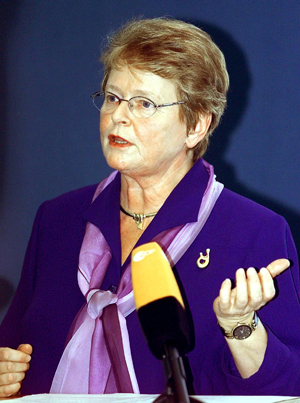Norway’s Agent of Care – and Change
Gro Harlem Brundtland, the First and Only Norwegian Female Prime Minister
Gro Harlem Brundtland, Norway's first female Prime Minister, always knew what she wanted to be when she grew up: Two things--a doctor--and a politician. Decades later, when a photographer became ill on one of her campaign flights, there was a doctor on board. The Prime Minister herself treated him.
"There is a very close connection between being a doctor and being a politician," she said in a 1989Time interview. "The doctor first tries to prevent illness, then tries to treat it if it comes. It's exactly the same as what you try to do as a politician, but with regard to society."
Brundtland worked in Norway's public health system and served as Minister for Environmental Affairs prior to leading the nation as Prime Minister. Not only was she the first female PM, she was the youngest, and headed an almost 50 percent female cabinet. Brundtland went on to become Director-General of the World Health Organization. In 2007, she was appointed a United Nations Special Envoy on Climate Change.

"We came here to answer the call of billions of women... Our generation must answer that call. Undoubtedly, we have moved forward. But the measure of our success will depend on the will of us all to fulfill what we have promised.
Now we must move on. All history of liberation struggles tells us that life, freedom, equality and opportunity have never been given. They have always been taken. We cannot maintain the illusion that someone else is going to do the job... Women, and men working with us, men who understand, we all must fight for that freedom. Today we know that women's contributions to the economy are decisive for growth and social development. We know that countries will continue to live in poverty if women remain under the heel of oppression. We know the costs of a continuing genderized apartheid.
Today, there isn't a single country in the world - not one - where men and women enjoy equal opportunities. So we must go back from Beijing - go home to change values and attitudes...We must go to the boardrooms, to the suburbia of Europe and North America, to all of our local communities, to our governments and to the United Nations' headquarters. This is where change is required...both in the North and in the South.
Not only must women become free and equal to make choices about their own lives. Not only must women have the right, the formal and protected right, to take part in the shaping of society. No, far more, women must make use of that right. Women power is a formidable force. We need women at all levels of management and government - local as well as national government...There are cabinets and parliaments in the world with few or no women. This situation cannot and will not last. And if the transition towards more real political representation is sluggish, affirmative action will work. It did, in Scandinavia.
We are adopting a comprehensive Platform for Action. All of its elements are important in this Agenda for change. Let me focus on some of its most compelling thrusts. We agree that women's education is essential. This year's Human Development Reports makes it emphatically clear. The economic returns on investing in women's education are fully comparable to those for men. But the social returns from educating women far exceed those of educating men....
Domestic violence against women can be said to be part of a ‘cultural patterns,' in more countries including my own...Clearly, freedom from violence and coercion must apply also in the sexual sphere of life. This conference has made clear what the existing human rights must mean in practice. The state becomes an accomplice if violence against women is seen as a separate cultural category of behaviors extraneous to the realm of justice and law enforcement.
Ingrained, centuries-old attitudes are not easily changed, but these which I have mentioned must be. The task requires action on the part of governments, religious groups and private, non-governmental organizations. Greater equality in the family is to the good for men, women and children. The allegations that this Conference is against motherhood and family are plainly absurd. Today, we recognize that poverty has a gender bias. The myth that men are the economic providers and women, mainly, are mothers and caregivers in the family has now been thoroughly refuted.
Women have always worked, in all societies and at all times. As a rule they have worked harder than men, and -- as a rule -- without pay and acknowledgement. Their contribution has been essential for national economies as well as to their families, where women have often been the chief breadwinners. As defined by statistics, societies have often kept women at arm's length. Women who work 10-12 hours a day in subsistence agriculture may be registered as ‘housewives' in the national censuses.
But overlooking women's contribution to the economy has had more severe damaging effects. Other women cannot even obtain a modest loan to become more independent and productive. In many countries, women own nothing; they inherit nothing and are unable to offer security. On top of that, laws often work against them. No, women will not become more empowered merely because we want them to be, but through change of legislation, increased information and by redirecting resources."

